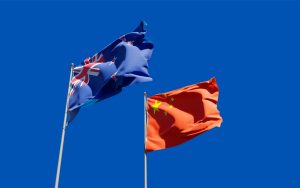“Warm and constructive”: That’s how New Zealand Prime Minister Chris Hipkins wanted his meeting with Chinese President Xi Jinping on Tuesday to be remembered. Hipkins deployed the phrase at least eight times in a subsequent press conference with the New Zealand media.
He was also keen to note that “the meeting was at no point adversarial.” This served to reinforce the impression of warmth.
It also matched with opening public comments by Xi, who said Hipkins’ visit was of “great significance.” Xi pointed to the “tangible benefits to the two peoples” that had emerged since China entered into a Comprehensive Strategic Partnership with New Zealand in 2014.
Xi added that “China has always treated New Zealand as a friend and partner and is ready to work together with New Zealand to start a new 50 years in the bilateral relationship,” according to a summary from the Chinese Foreign Ministry.
By emphasizing the friendliness of the meeting, Hipkins was also drawing a contrast with claims that his foreign minister, Nanaia Mahuta, had received an “epic haranguing” when she met her Chinese counterpart in Beijing in March. The timing of the leaked description to The Australian newspaper was strategic and threatened to derail Hipkins’ much sought-after appointment with Xi. The reporting was not denied, however, with Mahuta confirming her meeting with China’s Qin Gang was “very robust.”
Against this, Hipkins’ refusal to sign up to U.S. President Joe Biden’s description of Xi as a “dictator” would have been well received by Beijing. Hipkins refused to say whether the “dictator” issue had been brought up by Xi – but said he did not raise it himself.
According to China’s own account of the Hipkins-Xi meeting, the Chinese president declared that he has “always viewed the China-New Zealand relationship as of high importance,” with New Zealand acting as a “‘frontrunner’ in China’s relations with developed countries.”
Xi continued, in a message likely aimed not just at Wellington but at other Western governments: “We must continue to regard each other as partners rather than rivals, as opportunities rather than threats…”
As is usually the case, the semi-official Global Times newspaper made the same point less diplomatically.
In an article published late on Tuesday that focused on a range of diplomatic visits to China this week, New Zealand took center-stage – even overshadowing analysis of Mongolia and Vietnam, China’s neighbors, whose prime ministers are both in China this week as well.
The newspaper depicted New Zealand as something of a role model for other Western countries, noting Wellington’s reputation for “independent policymaking” and bipartisan consensus on “how to get along with China.” According to the paper, New Zealand showed how “Western countries can withstand the pressures of unilateralism, Cold War mentality and hegemony.”
The Global Times referenced approvingly Hipkins’ stance on the recent “dictator” spat. The paper said the incident was an example of New Zealand’s “non-interference when dealing with China” and contrasted sharply with the “arrogant and offensive attitude of Washington.”
After his meeting with Xi, Hipkins appeared somewhat nervous and at times uncharacteristically tongue-tied when answering questions from the New Zealand media – a sign that he was aware of the diplomatic stakes of the bilateral meeting. For example, he waffled on his response to a question about how New Zealand sees its relationship with China.
During the initial portion of the meeting that was open to the media, Xi called New Zealand a “friend and partner.” But when asked by media whether he would reciprocate this assessment, Hipkins initially dodged, responding, “I would describe the relationship between New Zealand and China as an incredibly important one.”
Hipkins appeared to realize the ramifications of his answer as the questioning on the “friend and partner” issue continued. He later added, “It depends on the context, but yes, by and large.”
Hipkins carefully declined to be drawn on what views Xi expressed during the private meeting, saying revealing details “wouldn’t be diplomatic or appropriate.” But the New Zealand prime minister did specify that AUKUS “wasn’t specifically discussed” during the meeting. Hipkins also disclosed that New Zealand’s growing ties with NATO were not canvassed.
The meeting with Xi was a big picture one and it would not be unusual for these issues of detail to be addressed more indirectly.
Hipkins said the main focus of the meeting was on New Zealand’s economic ties with China. But he added that issues such as the China-U.S. relationship, the Pacific, the war in Ukraine and human rights were also covered in a “free-flowing dialogue.”
The official statement issued by the New Zealand Prime Minister’s Office used softer language than the press conference. For example, there is no direct mention of “human rights” in the readout. Instead, it was noted that the pair “engaged on areas where our cultures and political systems differ.”
Hipkins’ 40-minute meeting with Xi ran for ten minutes longer than scheduled. Jacinda Ardern, Hipkins’ predecessor, received 50 minutes for her own meeting with Xi on the sidelines of the APEC summit in Bangkok last November.
We should not read too much into this discrepancy, however. After all, it is a busy week for China, which is also hosting its first summer meetings of the World Economic Forum since 2019. On Tuesday, Xi also met with the prime ministers of Barbados, Mongolia, and Vietnam.
Meanwhile, Hipkins’ counterparts from the other “Five Eyes” countries – Australia, Canada, the United Kingdom, and the United States – have not been hosted by Beijing since the pandemic began.
This article was originally published by the Democracy Project, which aims to enhance New Zealand’s democracy and public life by promoting critical thinking, analysis, debate, and engagement in politics and society.

































